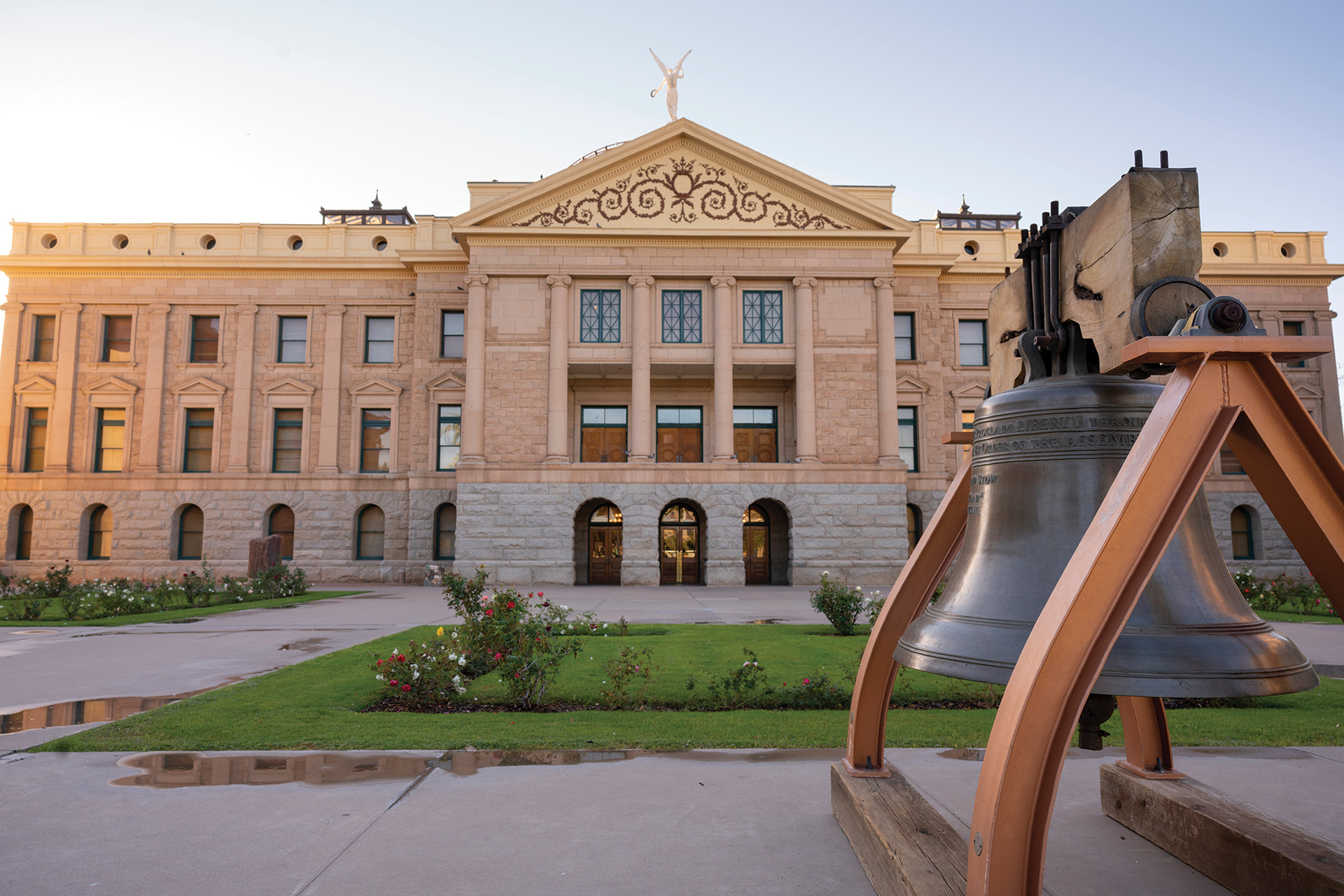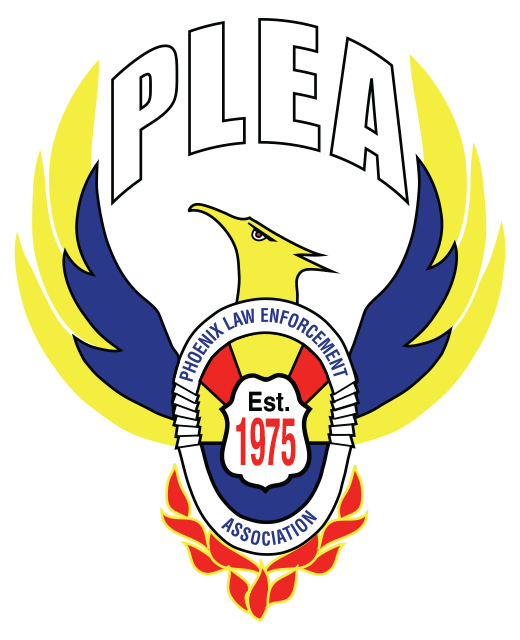 Once again, the Arizona Police Association (APA), in partnership with our member associations from across the state, is engaged in representing Arizona law enforcement and public safety officers at the State Capitol.
Once again, the Arizona Police Association (APA), in partnership with our member associations from across the state, is engaged in representing Arizona law enforcement and public safety officers at the State Capitol.
The 56th Legislature session began on January 10, 2023, and as of this writing, 1,625 bills have been introduced. Below are APA-sponsored bills, as well as a few others we have been actively working on. The list below are primary bills we have been engaged with, but it is not a complete list of all the bills the APA is monitoring.
HB 2002: DOC officers; personnel system; covered: This APA-sponsored bill will make Arizona correction supervisors up to the rank of captain “covered” employees again, providing them with “just cause” employment due process.
The bill was passed out of the House Military Affairs and Public Safety (MAPS) Committee on January 23 on a vote of 14–1.
HB 2336: tuition; family; post-traumatic stress; suicide: This APA-sponsored bill will provide tuition at the state universities and community colleges for the surviving dependents of police officers, firefighters and veterans who suffer from duty-related PTSD and subsequently commit suicide.
This bill was passed out of the House MAPS Committee on February 6 on a unanimous 15–0 vote. It will next move to the rules committee and then onto the floor for a full vote of the House.
HB 2418: law enforcement; response times; requirements: This bill would become a “strike everything” and would create a study committee to standardize the process of measuring emergency police response times and focus on the recruitment and retention of Arizona law enforcement. It’s scheduled for House MAPS on February 13.
HB 2478: aggravated assault; law enforcement employees: This APA-sponsored bill would protect non-sworn police employees by covering them with increased aggravated assault charges if assaulted in the course of their duties. This bill was passed out of the House MAPS Committee on a 15–0 vote on February 6.
HB 2484: failure to return vehicle; repeal: This APA-sponsored bill would repeal the failure to return vehicle-security interest law (A.R.S. 13-1813) if passed. Currently, under this law, the police are required to act as the repo man if someone fails to make their car payments. This bill is scheduled for House MAPS on February 13.
HB 2485: aggravated assault; ambush; police; classification: This bill would increase the felony classification for ambush assaults on police officers. It’s scheduled for the House MAPS Committee on February 13.
SB 1003: traffic violation; identification: This APA-sponsored bill would require a non-operator (pedestrian, bicyclist, passenger) violator of the traffic code, Title 28, to verbally provide their true name, date of birth and address to the officer. This bill was not scheduled for the committee, but we are looking for a striker to move the bill, mostly in the House.
SB 1301: law enforcement investigations; applicability: This APA-sponsored bill would retroactively apply to all disciplinary investigations not in compliance with 38-1110. This gives the agency one year to finish investigations that are older than 18 months, after which they are dismissed. This is scheduled for Senate MAPS on February 15.

It’s no secret that more and more politicians have targeted law enforcement with anti-police legislation. Thankfully, the Arizona Police Association (APA), a state labor group made up of more than 12,000 officers and over 50 police agencies, was hard at work fighting for the rights and interests of Arizona law enforcement, corrections, detention and probation officers in the legislative process on the local, state and national levels.
Thanks to the immense effort of the APA, several important bills were recently approved during the Arizona State Legislature’s 56th session that will benefit public safety.
Approved Bills That APA Supported
HB 2319: Law enforcement activity; recording prohibition: This bill makes it illegal to record an officer without permission within 15 feet of law enforcement activity.
HB 2159: Law enforcement officers; polygraph; examinations: This is our 38-1100 Officer Bill of Rights legislation, and it has four main components:
- 38-1104 and 38-1108: Eliminates the use of polygraphs in administrative investigations. Although most agencies rarely use them now due to their unreliability, this bill will eliminate their use statewide.
- 38-1106: Affirmatively allows the hearing officer in an administrative appeal to consider as a mitigating factor any violation of 38-1100 in the determination of discipline.
- 38-1110: In the event of multiple officers involved in the same investigation, if it is determined that any individual officer has not committed any wrongdoing, that officer must be provided a notice of findings and exited out of the investigation as it proceeds. The officer would still be under advisement not to speak about the investigation.
- 38-1112: Adds psychological examinations to fitness-for-duty exams. The current law is silent on psychological exams. This provision provides the same protections and procedures for psychological exams as it does for physical exams. It also now requires the agency to provide the officer with a copy of the medical report within five days of the department receiving it.
SB 1268: PSPRS; deferred retirement option plan: This bill extends the current DROP plan from five to seven years. It would likely have a different rate of return from the original DROP plan. This is to encourage and incentivize officers to stay longer to help address the current staffing crisis. The bill will also create a task force to address possible plan improvements to tiers 2 and 3 to assist in recruitment and retention of officers.
HB 2862: Appropriations; DPS and corrections pay increases: This bill requires the arresting officer to advise an arrest juvenile their rights and to notify the parents as practicable upon juvenile arrest. This bill was extensively amended to have less the impact on officers and investigations.
HB 2721: Law enforcement officers; AZPOST: This bill requires any entities (with some exceptions) that investigate or discipline law enforcement officers to have as their members at least two-thirds of law enforcement officers from the same department on those entities. This bill reinstated the provision of the original bill that was struct due to the “single-subject” lawsuit by the city of Phoenix.
HB 2349: Peace officer standards board; membership: This bill changes the requirement so that one of the two officer representatives will no longer have to be a deputy (a deputy can still serve as one of the officers). Both officers must still be non-supervisors.
HB 2343: Interfering with a crime scene investigation; classification: This bill classifies disobeying a peace officer’s verbal order to remain off the premises of a possible crime scene as a Class 1 misdemeanor.
Approved Bills That APA Opposed
While there were many APA-backed bills that were approved, there were, unfortunately, some that were opposed that still went through. Still, the APA will continue fighting for PLEA members to ensure their rights and safety are a top priority against these harmful public safety bills.
HB 2309: Detained juveniles; advisements; notifications: This bill requires the arresting officer to immediately advise an arrest juvenile of their rights and to notify the parents of the juvenile arrest within 90 minutes.
HB 2518: Peace officers; liability; unlawful acts: This bill eliminates qualified immunity.
HB 2358: Sexual assault; survivor’s rights: This bill has some issues of concern as to implementation and operational impact, as well as investigative and prosecution compromise, such as providing an unredacted copy of the investigation at any time the victim asks for it.
HB 2222: Independent corrections oversight committee: This bill creates a very heavyweight inmate advocacy oversight board.
HB 2688: Prisoner searches; requirements: This bill places safety and operational challenges on DOC officers’ ability to conduct inmate searches.
SB 1166: Public employers: public monies: contracts: union activities: standing: state preemption: definitions: This bill eliminates public employer union contracts and union activities, including being able to lobby or advocate for a political candidate.
Other Approved Legislation
HB 2347: Law enforcement; misconduct investigations; extension: An employer shall make a good faith effort to complete any investigation of employee misconduct within 180 calendar days after the employer receives notice of the allegation by a person authorized by the employer to initiate an investigation of the misconduct. The investigation is considered complete on the date the employee is served with the notice of discipline or the notice of findings.
HB 2340: Disciplinary appeals; final disposition reporting: In any appeal of a disciplinary action by a law enforcement officer, the parties shall cooperate with each other, act in good faith and exchange copies of all relevant documents and a list of all witnesses pursuant to the following time periods and requirements.
 The Arizona Police Association (APA) is a state labor group made up of more than 12,000 officers and over 50 police agencies. One of its primary purposes is to protect the interests of Arizona law enforcement, corrections, detention and probation officers in the legislative process on the local, state and national levels.
The Arizona Police Association (APA) is a state labor group made up of more than 12,000 officers and over 50 police agencies. One of its primary purposes is to protect the interests of Arizona law enforcement, corrections, detention and probation officers in the legislative process on the local, state and national levels.
The Arizona State Legislature began its 56th session on January 10, 2022. So far, 1,512 bills have been introduced. Here are some of the proposed law-enforcement-related bills that are being monitored by the APA and its lobbying firm, Willetta Partners.

Bills Supported by the APA
HB 2159: Law enforcement officers; polygraph; examinations: This is our 38-1100 Officer Bill of Rights legislation, and it has four main components:
- 38-1104 and 38-1108: Eliminates the use of polygraphs in administrative investigations. Although most agencies rarely use them now due to their unreliability, this bill will eliminate their use statewide.
- 38-1106: Affirmatively allows the hearing officer in an administrative appeal to consider as a mitigating factor any violation of 38-1100 in the determination of discipline.
- 38-1110: In the event of multiple officers involved in the same investigation, if it is determined that any individual officer has not committed any wrongdoing, that officer must be provided a notice of findings and exited out of the investigation as it proceeds. The officer would still be under advisement not to speak about the investigation.
- 38-1112: Adds psychological examinations to fitness-for-duty exams. The current law is silent on psychological exams. This provision provides the same protections and procedures for psychological exams as it does for physical exams. It also now requires the agency to provide the officer with a copy of the medical report within five days of the department receiving it.
HB 2248: Failure to return vehicle; repeal: This bill would repeal ARS 13-1813, stolen vehicle-security interest. This law essentially makes the police the repo men for used car dealers and auto loan companies.
HB 2319: Law enforcement activity; recording prohibition: This bill would make it illegal to record an officer without permission within 15 feet of law enforcement activity.
HB 2341: Appropriations; corrections officers; salary increase: This bill seeks to increase the pay of Arizona corrections officers.
HB 2342: Appropriations; DPS; salary increase: This bill seeks to increase the pay of Arizona state troopers.
HB 2343: Interfering with a crime scene investigation; classification: This bill would classify disobeying a peace officer’s verbal order to remain off the premises of a possible crime scene as a Class 1 misdemeanor.
HB 2349: Peace officer standards board; membership: This bill would change the requirement so that one of the two officer representatives will no longer have to be a deputy (a deputy can still serve as one of the officers). Both officers must still be non-supervisors.
HB 2354: Tuition; family; post-traumatic stress; suicide: This bill would provide free college tuition at any state university for the surviving dependents of police, firefighters and veterans who suffer from duty-related PTSI and subsequently commit suicide.
HB 2589: DOC officers; personnel system; covered: Several years ago, sworn Arizona Department of Corrections supervisors lost their employment protections and became “at-will” employees. This bill attempts to reinstate those employment protections.
SB 1268: PSPRS; deferred retirement option plan: This bill would extend the current DROP plan from five to seven years. It would likely have a different rate of return from the original DROP plan. This is to encourage and incentivize officers to stay longer to help address the current staffing crisis. The bill would also create a task force to address possible plan improvements to tiers 2 and 3 to assist in recruitment and retention of officers. (Note: This bill is currently being drafted through the stakeholder process.)
Bills Opposed by the APA
HB 2222: Independent corrections oversight committee: This bill would create a very heavyweight inmate advocacy oversight board.
HB 2309: Detained juveniles; advisements; notifications: This bill would require the arresting officer to immediately advise an arrest juvenile of their rights and to notify the parents of the juvenile arrest within 90 minutes.
HB 2358: Sexual assault; survivors rights: This bill has some issues of concern as to implementation and operational impact, as well as investigative and prosecution compromise, such as providing an unredacted copy of the investigation at any time the victim asks for it.
HB 2518: Peace officers; liability; unlawful acts: This bill would eliminate qualified immunity.
HB 2688: Prisoner searches; requirements: This bill would place safety and operational challenges on DOC officers’ ability to conduct inmate searches.
SB 1166: Public employers: public monies: contracts: union activities: standing: state preemption: definitions: This bill would eliminate public employer union contracts and union activities, including being able to lobby or advocate for a political candidate.
For further information and updates on these and other current bills, please check the Arizona Legislature’s bill status inquiry page at apps.azleg.gov/BillStatus/BillOverview, or visit the APA website at azpolice.org.
